高一英语必修一各单元知识点总结及重难点解析
- 格式:pdf
- 大小:269.19 KB
- 文档页数:36
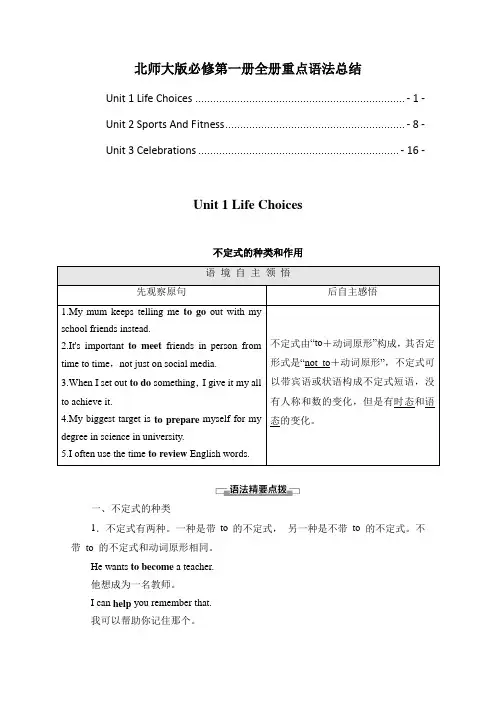
北师大版必修第一册全册重点语法总结Unit 1 Life Choices ...................................................................... - 1 - Unit 2 Sports And Fitness ............................................................ - 8 - Unit 3 Celebrations ................................................................... - 16 -Unit 1 Life Choices不定式的种类和作用语境自主领悟先观察原句后自主感悟1.My mum keeps telling me to go out with myschool friends instead.2.It's important to meet friends in person fromtime to time,not just on social media.3.When I set out to do something,I give it my allto achieve it.4.My biggest target is to prepare myself for mydegree in science in university.5.I often use the time to review English words.不定式由“to+动词原形”构成,其否定形式是“not to+动词原形”,不定式可以带宾语或状语构成不定式短语,没有人称和数的变化,但是有时态和语态的变化。
一、不定式的种类1.不定式有两种。
一种是带to的不定式,另一种是不带to 的不定式。
不带to 的不定式和动词原形相同。
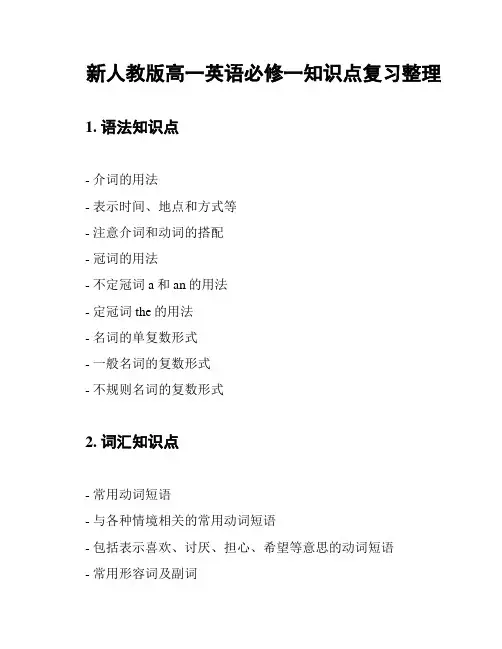
新人教版高一英语必修一知识点复习整理1. 语法知识点
- 介词的用法
- 表示时间、地点和方式等
- 注意介词和动词的搭配
- 冠词的用法
- 不定冠词a和an的用法
- 定冠词the的用法
- 名词的单复数形式
- 一般名词的复数形式
- 不规则名词的复数形式
2. 词汇知识点
- 常用动词短语
- 与各种情境相关的常用动词短语
- 包括表示喜欢、讨厌、担心、希望等意思的动词短语
- 常用形容词及副词
- 描述人、事物特征的常用形容词
- 表示时间、程度、方式等的常用副词- 高频词汇
- 重点掌握高频出现的单词和常用短语3. 阅读技巧
- 预测文意
- 根据上下文预测单词或句子的意思
- 联系上下文理解文章
- 通过上下文的线索来理解全文意思
- 抓住文中关键信息
- 注意文章中的重点句子,理解文章主旨4. 写作技巧
- 语法正确性
- 注意动词时态和主谓一致
- 尽量避免语法错误
- 结构完整性
- 确保文章有开头、主体和结尾
- 逻辑连贯性
- 使用适当的连接词
- 使用连接词使句子和句子之间衔接紧密
以上是《新人教版高一英语必修一》的知识点复习整理,希望对你的学习有所帮助。
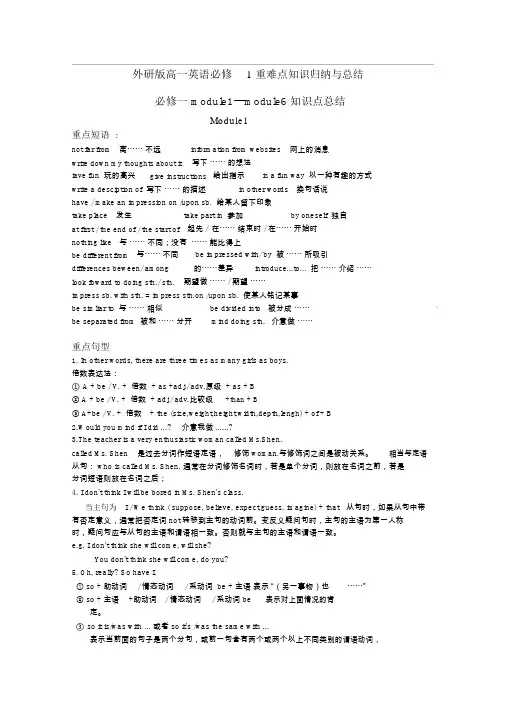
外研版高一英语必修 1 重难点知识归纳与总结必修一 module1---module6 知识点总结Module1重点短语:not far from离⋯⋯不远information from websites网上的消息write down my thoughts about it写下⋯⋯ 的想法iave fun 玩的高兴give instructions给出指示in a fun way 以一种有趣的方式write a desciption of 写下⋯⋯的描述in other words换句话说have / make an impression on /upon sb. 给某人留下印象take place发生take part in 参加by oneself 独自at first / the end of / the start of起先 /在⋯⋯结束时 / 在⋯⋯开始时nothing like与⋯⋯ 不同;没有⋯⋯ 能比得上be different from与⋯⋯不同be impressed with/ by 被⋯⋯所吸引differences beween/ among的⋯⋯差异introduce...to... 把⋯⋯介绍⋯⋯look foward to doing sth./ sth.期望做⋯⋯ / 期望⋯⋯impress sb. with sth. = impress sth.on /upon sb. 使某人铭记某事be simliar to 与⋯⋯相似be divided into被分成⋯⋯be separated from被和⋯⋯ 分开mind doing sth.介意做⋯⋯重点句型1. In other words, there are three times as many girls as boys.倍数表达法:①A + be / V. + 倍数 + as +adj./ adv.原级 + as + B② A + be / V. + 倍数 + adj./ adv.比较级+than + B③ A+be / V. + 倍数+ the (size,weight,height,width,depth,lengh) + of + B2.Would you mind if I did ...?介意我做......?3.The teacher is a very enthusiastic woman called Ms.Shen.called Ms. Shen是过去分词作短语定语,修饰woman.与修饰词之间是被动关系。

(直打版)高一英语各单元知识点总结及重难点解析(word版可编辑修改) 编辑整理:尊敬的读者朋友们:这里是精品文档编辑中心,本文档内容是由我和我的同事精心编辑整理后发布的,发布之前我们对文中内容进行仔细校对,但是难免会有疏漏的地方,但是任然希望((直打版)高一英语各单元知识点总结及重难点解析(word版可编辑修改))的内容能够给您的工作和学习带来便利。
同时也真诚的希望收到您的建议和反馈,这将是我们进步的源泉,前进的动力。
本文可编辑可修改,如果觉得对您有帮助请收藏以便随时查阅,最后祝您生活愉快业绩进步,以下为(直打版)高一英语各单元知识点总结及重难点解析(word版可编辑修改)的全部内容。
高一英语各单元知识点总结及重难点解析Unit1-2☆重点句型☆1。
What should a friend be like? 询问对方的看法2. I think he / she should be…表示个人观点的词语3. I enjoy reading / I'm fond of singing / I like playing computer games。
等表示喜好的词语4。
Chuck is on a flight when suddenly his plane crashes。
“when"作并列连词的用法5。
What / Who / When / Where is it that.。
?强调句的特殊疑问句结构6. With so many people communicating in English everyday,。
.。
“with+宾语+宾补"的结构做状语7. Can you tell me how to pronounce..。
? 带连接副词(或代词)的不定式做宾补的用法☆重点词汇☆1。
especially v。
特别地2。
imagine v. 想像3. alone adv。
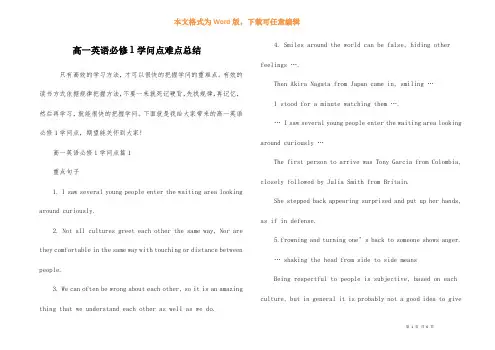
高一英语必修1学问点难点总结只有高效的学习方法,才可以很快的把握学问的重难点。
有效的读书方式依据规律把握方法,不要一来就死记硬背,先找规律,再记忆,然后再学习,就能很快的把握学问。
下面就是我给大家带来的高一英语必修1学问点,期望能关怀到大家!高一英语必修1学问点篇1重点句子1. I saw several young people enter the waiting area looking around curiously.2. Not all cultures greet each other the same way, Nor are they comfortable in the same way with touching or distance between people.3. We can often be wrong about each other, so it is an amazing thing that we understand each other as well as we do.4. Smiles around the world can be false, hiding other feelings ….Then Akira Nagata from Japan came in, smiling …I stood for a minute watching them ….… I saw several young people enter the waiting area looking around curiously …The first person to arrive was Tony Garcia from Colombia, closely followed by Julia Smith from Britain.She stepped back appearing surprised and put up her hands, as if in defense.5.frowning and turning one’s back to someone shows anger.… shaking the head from side to side meansBeing respectful to people is subjective, based on each culture, but in general it is probably not a good idea to givea hug to a boss or a teacher.Standing at a little distance with open hands will show that …There are many ways around the world to show agreement, but nodding the head up and down is used for ….6. These actions are not good or bad, but are simply ways in which cultures have developed.高一英语必修1学问点篇2单词1、重点单词讲解。
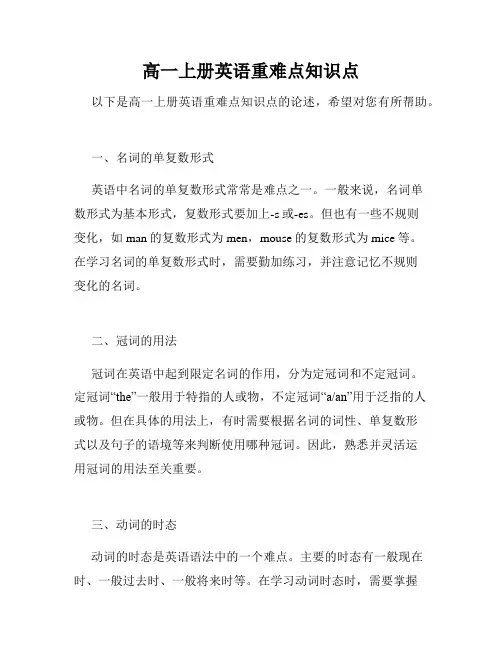
高一上册英语重难点知识点以下是高一上册英语重难点知识点的论述,希望对您有所帮助。
一、名词的单复数形式英语中名词的单复数形式常常是难点之一。
一般来说,名词单数形式为基本形式,复数形式要加上-s或-es。
但也有一些不规则变化,如man的复数形式为men,mouse的复数形式为mice等。
在学习名词的单复数形式时,需要勤加练习,并注意记忆不规则变化的名词。
二、冠词的用法冠词在英语中起到限定名词的作用,分为定冠词和不定冠词。
定冠词“the”一般用于特指的人或物,不定冠词“a/an”用于泛指的人或物。
但在具体的用法上,有时需要根据名词的词性、单复数形式以及句子的语境等来判断使用哪种冠词。
因此,熟悉并灵活运用冠词的用法至关重要。
三、动词的时态动词的时态是英语语法中的一个难点。
主要的时态有一般现在时、一般过去时、一般将来时等。
在学习动词时态时,需要掌握动词的规则变化和使用方法,并注意与时间状语的搭配。
此外,还要了解一些常见的非谓语动词形式,如动词不定式、动名词和现在分词等。
四、介词的使用介词是连接词与词、短语与短语之间关系的一种词类。
常用的介词有in、on、at、from、to等。
介词的正确使用对句子的意思和结构起着至关重要的作用。
需要注意的是,介词的用法需要根据具体的语境和动词的搭配来确定。
对于一些常见的介词短语,如at the same time、in front of、at the end of等,也需要记忆和练习。
五、连词的运用连词在英语中起到连接句子、短语或词的作用。
常见的连词有and、but、or、so等。
在使用连词时,需要注意它们的语法作用和具体的搭配规则。
例如,and用于连接并列的词或句子,but用于转折或表示对立的词或句子等。
此外,还需要注意一些固定搭配的用法,如either...or、neither...nor等。
六、形容词和副词的区别和比较级形容词和副词是描述词性的词类。
形容词用于修饰名词,副词用于修饰动词、形容词或其他副词。
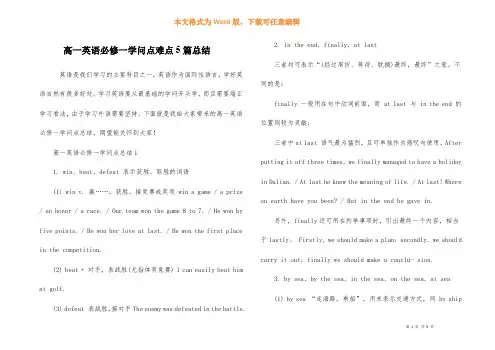
高一英语必修一学问点难点5篇总结英语是我们学习的主要科目之一,英语作为国际性语言,学好英语自然有很多好处。
学习英语要从最基础的学问开头学,而且需要端正学习看法,由于学习外语需要坚持。
下面就是我给大家带来的高一英语必修一学问点总结,期望能关怀到大家!高一英语必修一学问点总结11. win, beat, defeat 表示获胜、取胜的词语(1) win v. 赢……,获胜,接竞赛或奖项 win a game / a prize / an honor / a race. / Our team won the game 8 to 7. / He won by five points. / He won her love at last. / He won the first placein the competition.(2) beat + 对手,表战胜(尤指体育竞赛) I can easily beat him at golf.(3) defeat 表战胜,接对手The enemy was defeated in the battle. 2. in the end, finally, at last三者均可表示“(经过周折、等待、耽搁)最终,最终”之意。
不同的是:finally 一般用在句中动词前面,而 at last 与 in the end 的位置则较为灵敏;三者中at last 语气最为猛烈,且可单独作为感叹句使用。
After putting it off three times, we finally managed to have a holiday in Dalian. / At last he knew the meaning of life. / At last! Where on earth have you been? / But in the end he gave in.另外,finally还可用在列举事项时,引出最终一个内容,相当于lastly。

(非常全)人教高中英语必修一各单元知识点汇总主要内容包括:一、重点短语二、语法目录:Unit One FriendshipUnit two English around the worldUnit 3 Travel journalUnit four EarthquakesUnit 5 Nelson Mandela – a modern heroUnit One Friendship一、重点短语1.go through 经历,经受get through 通过;完成;接通电话2. set down 记下,放下3. a series of 一系列4. on purpose 有目的的5. in order to 为了6. at dusk 傍晚,黄昏时刻7. face to face 面对面8. fall in love 爱上9. join in 参加(某个活动);take part in 参加(活动)join 加入(组织,团队,并成为其中一员)10. calm down 冷静下来11. suffer from 遭受12. be/get tired of…对…感到厌倦13. be concerned about 关心14. get on/along well with 与…相处融洽15. be good at/do well in 擅长于…16. find it + adj. to do sth. 发现做某事是…17. no longer / not …any longer 不再…18. too much 太多(后接不可数n.)much too 太…(后接adj.)19. not…until 直到…才20. it’s no pleasure doing sth 做…并不开心21. make sb. sth. 使某人成为…make sb. do sth. 使某人做某事二、语法----直接引语和间接引语概念:直接引语:直接引述别人的原话。
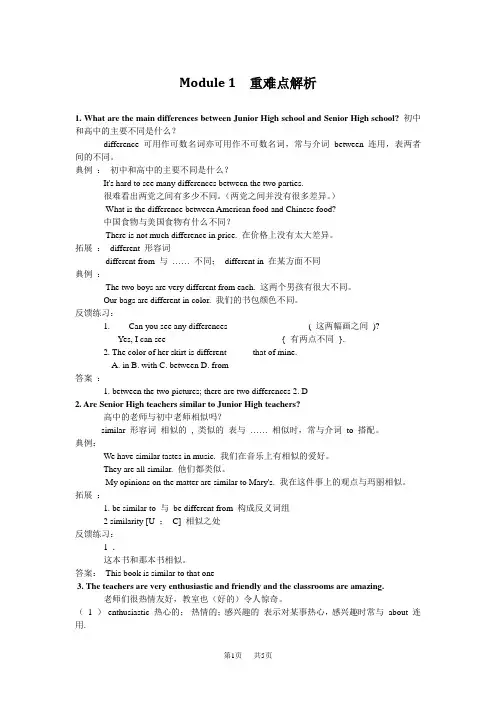
Module 1 重难点解析1. What are the main differences between Junior High school and Senior High school?初中和高中的主要不同是什么?difference 可用作可数名词亦可用作不可数名词,常与介词between 连用,表两者间的不同。
典例:初中和高中的主要不同是什么?It's hard to see many differences between the two parties.很难看出两党之间有多少不同。
(两党之间并没有很多差异。
)What is the difference between American food and Chinese food?中国食物与美国食物有什么不同?There is not much difference in price. 在价格上没有太大差异。
拓展:different 形容词different from 与…… 不同;different in 在某方面不同典例:The two boys are very different from each. 这两个男孩有很大不同。
Our bags are different in color. 我们的书包颜色不同。
反馈练习:1. ----- Can you see any differences __________________( 这两幅画之间)?-----Yes, I can see __________________________{ 有两点不同}.2. The color of her skirt is different _____ that of mine.A. inB. withC. betweenD. from答案:1. between the two pictures; there are two differences2. D2. Are Senior High teachers similar to Junior High teachers?高中的老师与初中老师相似吗?similar 形容词相似的, 类似的表与…… 相似时,常与介词to 搭配。
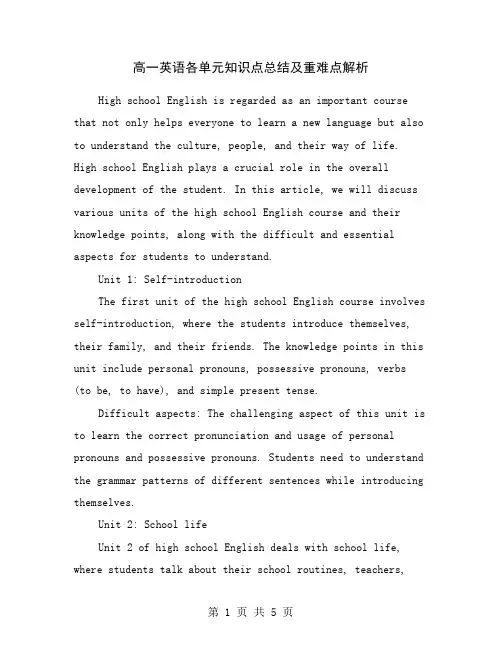
高一英语各单元知识点总结及重难点解析High school English is regarded as an important course that not only helps everyone to learn a new language but also to understand the culture, people, and their way of life. High school English plays a crucial role in the overall development of the student. In this article, we will discuss various units of the high school English course and their knowledge points, along with the difficult and essential aspects for students to understand.Unit 1: Self-introductionThe first unit of the high school English course involves self-introduction, where the students introduce themselves, their family, and their friends. The knowledge points in this unit include personal pronouns, possessive pronouns, verbs (to be, to have), and simple present tense.Difficult aspects: The challenging aspect of this unit is to learn the correct pronunciation and usage of personal pronouns and possessive pronouns. Students need to understand the grammar patterns of different sentences while introducing themselves.Unit 2: School lifeUnit 2 of high school English deals with school life, where students talk about their school routines, teachers,and classmates. The knowledge points in this unit include adjectives, adverbs, simple present tense, and prepositions.Difficult aspects: The tough aspect of this unit is to learn how to use adjectives and adverbs in the right place, and the proper usage of prepositions.Unit 3: HolidaysUnit 3 of high school English course talks about holidays and vacations. Students learn new words and phrases relatedto traveling, planning, and things to do during a vacation. The knowledge points in this unit include future tense, modal verbs like "will" and "going to," and word order in sentences.Difficult aspects: The difficult component of this unitis to learn the correct forms and usage of modal verbs, and word order in a sentence while using the future tense.Unit 4: Healthy lifeUnit 4 of the high school English course deals withliving a healthy life, where students learn about diet, exercise, and healthy habits. The knowledge points in thisunit include vocabulary related to food, present continuous tense, and simple past tense.Difficult aspects: The difficult aspect of this unit isto learn the correct pronunciation and usage of vocabulary related to food items, present continuous tense, and how to describe past activities.Unit 5: Family and friendsUnit 5 of the high school English course deals withfamily and friends. Students learn how to describe people, their relationships, and their professions. The knowledge points in this unit include the use of quantifiers such as many, much, few, and a few; comparatives and superlatives and the present continuous tense.Difficult aspects: The difficult aspect of this unit is to learn the appropriate usage of quantifiers, comparatives, and superlatives, and how to describe people and their relationships with the right vocabulary.Unit 6: Home and aroundUnit 6 of high school English course deals with the vocabulary related to the home and surrounding areas. Students learn new words and phrases relating to their neighborhoods. The knowledge points of this unit include prepositions of place, present perfect tense, and vocabulary related to home.Difficult aspects: The complex feature of this unit is to learn prepositions of place and the correct use of vocabulary related to households.Unit 7: EntertainmentUnit 7 of high school English course deals with entertainment, where students learn new words related to TV,movies, and music. The knowledge points to this unit include context clues, passive voice, and infinitives used as the object of verbs.Difficult aspects: The difficult aspect of this unit is to learn the correct usage of passive voice and infinitives used as the object of verbs, and how to use context clues to guess the meaning of words.Unit 8: NatureUnit 8 of the high school English course deals with nature and environmental issues, where students learn new words and phrases related to nature, plants, and animals. The knowledge points of this unit include adjectives, adverbs, and the simple present tense.Difficult aspects: The difficult aspect of this unit is to learn the contextual usage of adjectives and adverbs, with the right pronunciation and the correct tense to describe nature, plants, and animals.In conclusion, high school English course is not just about learning a new language; it's about developing a better understanding of different cultures, people, and their way of life. Understanding the knowledge points and difficult aspects of each unit is essential for students to acquire English proficiency, thus benefiting their overall development.。
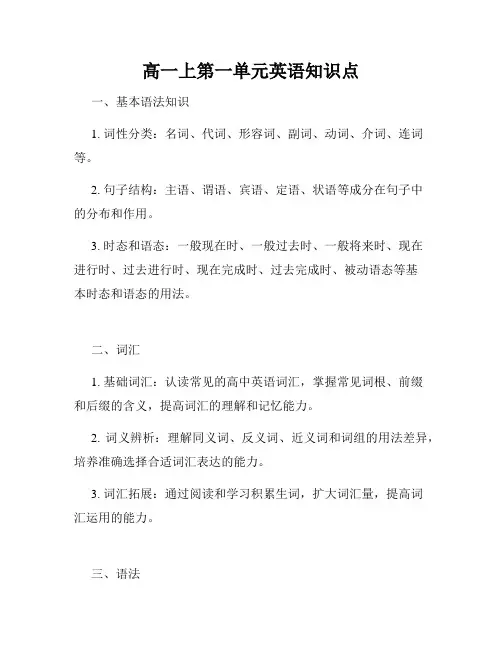
高一上第一单元英语知识点一、基本语法知识1. 词性分类:名词、代词、形容词、副词、动词、介词、连词等。
2. 句子结构:主语、谓语、宾语、定语、状语等成分在句子中的分布和作用。
3. 时态和语态:一般现在时、一般过去时、一般将来时、现在进行时、过去进行时、现在完成时、过去完成时、被动语态等基本时态和语态的用法。
二、词汇1. 基础词汇:认读常见的高中英语词汇,掌握常见词根、前缀和后缀的含义,提高词汇的理解和记忆能力。
2. 词义辨析:理解同义词、反义词、近义词和词组的用法差异,培养准确选择合适词汇表达的能力。
3. 词汇拓展:通过阅读和学习积累生词,扩大词汇量,提高词汇运用的能力。
三、语法1. 一般现在时:表示经常性的动作或存在的状态。
2. 一般过去时:表示过去某个时间发生或存在的动作或状态。
3. 一般将来时:表示将来某个时间将要发生的动作或存在的状态。
4. 现在进行时:表示现在正在进行的动作。
5. 过去进行时:表示过去某一时间正在进行的动作。
6. 现在完成时:表示过去发生的动作对现在造成的影响或结果。
7. 过去完成时:表示在过去某一时间或动作之前已经完成的动作。
8. 被动语态:表示主语是动作的承受者。
四、阅读技巧1. 掌握阅读技巧:快速浏览、定位信息、理解上下文、猜测词义等。
2. 阅读理解题型:主题理解、细节理解、推理判断、主旨概括等不同类型题目的解题方法。
3. 阅读速度与准确性的平衡:追求阅读速度的同时保证理解和准确性。
五、写作技巧1. 了解写作要求和题目要求:明确写作目的和内容要点,合理组织文章结构。
2. 文章开头和结尾:开门见山,概括全文主题;合理总结,给读者留下深刻印象。
3. 逻辑清晰、结构严谨:段落之间衔接自然,逻辑顺序清晰,表达通顺、流畅。
4. 使用丰富的词汇和句式:避免重复和单调,使用多样的词汇和句型丰富文章表达。
5. 注意语法和标点准确性:保持语法正确,注意标点符号的使用。
六、听力技巧1. 集中注意力:用耳朵和思维同时集中注意力,理解并记忆听到的内容。
必修一unit1 单元知识点重难点及详解精品1答案:B What’s the matter with sb.“??怎么了?”本身就是陈述语序。
主句时态为过去时,故从句中也应用过去时。
2答案:B 本题题意:救援者非常担心那两个被困井下的人的安全。
grateful“感激的”;concerned“关心的,担心的”;extreme“极端的”;frightened“害怕的”。
3答案:D 本题题意:这是她第三次到这个山村看望孩子们。
It was the third time...“这是(某人)第三次??”(从句中应用过去完成时)。
4答案:B 本题题意:迈克和珍妮特在结婚前已经相爱一年多了。
从句中got 的时态可知主句的时态应用过去完成时。
fall in love表瞬间动作;be in love 表状态。
5答案:C 考查形容词词义辨析。
常识可以推断出“昨天她听说你在街上发生交通事故时”应该是“很不安,很难过”,故选C。
A、B都是听到令人开心的事之后的反应;D项意为“感激的,表示谢意的”也不符合语境。
6答案:A 本题题意:萨姆总是把我的名字读错,你认为他是故意的吗?on pur pose“故意地”;at present“目前”;at an end“结束”;right away“马上”。
7答案:A 考查情态动词。
本题题意:我不该看那部电影的,那会让我做噩梦。
shouldn’t“不应该”;needn’t“不必”;couldn’t“不可能”;mustn’t不与have done 连用。
8答案:C have trouble with sth.“在某方面有困难”;be grateful to sb.(for sth.)“因??而感激某人”。
9答案:C 本题题意:“你完成你的实验报告了吗,简?”“噢,天哪。
我完全忘了这事了。
”strongly“强有力地,强烈地”;extremely“极其,非常”;entirely“完全地”;freely“自地”。
Unit 1 Good Friends一、语法Direct and Indirect Speech(1)直接引语和间接引语1.直接引语在改为间接引语时,时态需要做相应的调整。
eg: "I broke your CD player."(一般过去时改成过去完成时)He told me he had broken my CD player.Jenny said,"I have lost a book."(现在完成时改成过去完成时)Jenny said she had lost a book.Mum said,"I’ll go to see a friend."(一般将来时改成过去将来时)Mum said she would go to see a friend.He said,"We hadn't finished our homework."(过去完成时保留原有的时态)He said they hadn't finished their homework.注意:直接引语是客观真理,过去进行时,时态不变。
2.在直接引语变间接引语时,如果从句中的主语时第一人称或被第一人称所修饰,从句中的人称要按照主句中主语的人称变化。
如:Mary said,"My brother is an engineer."Mary said her brother was and engineer.3.直接引语如果是反意疑问句,选择疑问句或一般疑问句,间接引语应改为由whether或if引导的宾语从句。
如:He said,"Can you run, Mike?"He asked Mike whether/if he could run.4.直接引语如果是祈使句,间接引语应改为“tell(ask, order, beg等) sb (not) to do sth”句型。
千里之行,始于足下。
高一英语必修一知识难点深度梳理202X高一英语必修一知识难点深度梳理()高一英语必修一是学生进入高中后所学习的第一本英语教材,是打牢英语基础的重要一步。
在学习必修一的过程中,学生会遇到一些难点和重点知识点。
下面将对高一英语必修一的知识难点进行深度梳理,以帮助学生更好地理解和掌握。
1. 形容词和副词比较级的用法:形容词的比较级用于比较两个事物的程度或范围。
它的构成有两种形式:一是在形容词后加er,如:bigger;二是在形容词前加more,如:more interesting。
比较级还常用于表示一种趋势或变化。
副词比较级也有类似的用法。
2. 物主代词的用法:物主代词用于表示所属关系,其基本形式有:mine, yours, his, hers, its, ours, theirs。
物主代词可以在句子中作主语、宾语和定语。
3. 情态动词的用法:情态动词用于表示说话人的意愿、能力、许可等情态。
情态动词有:can, could, may, might, must, shall, should, will, would等。
情态动词后接动词原形,表示主语的能力、意愿或许可。
4. 宾语从句的用法:宾语从句用于作及物动词或介词的宾语。
宾语从句的引导词有:that, what, if, whether等。
宾语从句的时态要求与主句保持一致,其中if引导的宾语从句表示条件,whether引导的宾语从句表示选择。
第1页/共2页锲而不舍,金石可镂。
5. 特殊疑问句的用法:特殊疑问句用于询问特定信息或选择。
特殊疑问词包括:what, where, when, why, how, who, whom, whose等。
特殊疑问句的语序为疑问词+谓语+主语+其他。
6. 现在完成时的用法:现在完成时用于表示过去发生的行为或事件对现在造成的影响或结果,句中常包含表示时间的状语,如:already, yet, just等。
Unit11.谚语:a friend in need is a friend indeed 患难见真情A friend is like a second self. 朋友是另一个自我。
2.词汇练兵--从积极和消积的方面讨论朋友Positive: honest, friendly, open-minded, generous大方的,helpful, patient耐心的, good-tempered好脾气的, trustworthy可信任的, careful, full of love, caring, responsible有责任感的,brave, easygoing随和的, outgoing好交际的, warm-hearted, kind, selfless无私的, tolerant 宽大的, intelligent聪明的Negative: selfish自私的,tricky狡猾的, dishonest, bad-tempered, mean 小气的, impatient, narrow-minded心胸狭窄的, lazy, gossipy3.故事性文章阅读技巧:when\where\who\what\why\how1 Anne kept a diary because she could tell everything to it.2 She felt very lonely because she couldn't meet her friends.3 They had to hide because Jews were caught by Nazis and put away.4 Anne named her diary Kitty because she thought it was her best friend.5 They were finally caught because they were discovered.What and how:1 Anne Frank and her family hid away for___A over a yearB over two yearsC three years C one year and a half2 According to Anne ,a true friend is a person___A that would laugh at youB who makes you happyC whom you can trustD who could save your life3 Anne said that she had grown crazy about nature because___A her interest in nature had grownB she had always been soC she had been outdoors too longD she had been indoors too long4 She didn’t dare open the window when the moon was bright .That’s because___A they might be discoveredB her family might bedisturbedC it was very coldD a thief might get into the room5 Anne and her family were caught by German Nazis___A about June 1945B about February 1945C about December 1944D about November 19444、一首有情诗(旨在提高对友谊的认识)A Forever FriendSometimes in life 有时候在生活中You find a special friend 你会找到一个特别的朋友Someone who changes your life just by being part of it他只是你生活中的一部分内容,却能改变你整个的生活Someone who makes you laugh until you can't stop他会把你逗得开怀大笑Someone who makes you believe that there really is good in the world他会让你相信人间有真情Someone who convinces you that there really is an unlocked door just waiting for you to open it 他会让你确信,真的有一扇不加锁的门,在等待着你去开启This is Forever Friendship 这就是永远的友谊When you're down 当你失意and the world seems dark and empty 当世界变得黯淡与空虚Your forever friend lifts you up in spirits and makes that dark and empty world suddenly seem bright and full你真正的朋友会让你振作起来,原本黯淡、空虚的世界顿时变得明亮和充实Your forever friend gets you through the hard times,the sad times, and the confused times你真正的朋友会与你一同度过困难、伤心和烦恼的时刻If you turn and walk away 你转身走开时Your forever friend follows 真正的朋友会紧紧相随If you lose you way 你迷失方向Your forever friend guides you and cheers you on真正的朋友会引导你,鼓励你Your forever friend holds your hand and tells you that everything is going to be okay.真正的朋友会握着你的手,告诉你一切都会好起来And if you find such a friend 如果你找到了这样的朋友,You feel happy and complete 你会快乐,觉得人生完整Because you need not worry 因为你无需再忧虑Your have a forever friend for life 你拥有了一个真正的朋友And forever has no end 永永远远,永无止境So to you(从诗中你可以体会到):you may need friends to help me/ calm me down when I was upset OR to share my worries and secrets in my inner world OR to share my happiness and sorrows OR to be concerned about my feelings1. The news quite u_____ him.2. We are all c_______ about / for your safety.课文要点(模块)Ⅰ.课文词汇等填空(旨在复习本课文中的单词拼写和主要词语等)根据课文内容完成下面语法填空,注意单词拼写和词语用法:Anne Frank is a 1 (犹太的)girl who lived in Netherlands during the World War II. Her family had to 2 or they would be caught by the 3 (德国的)Nazis. During the time in the 4 (隐匿的)place, Anneset down a 5 (系列)of facts in a diary . Anne made her diary her best friend 6 she could tell everything to and in the diary she showed us 7 she 8 (经历)during the war.Ⅲ.课文佳句背诵与仿写(旨在培养对难句的理解和写作能力)1.【原句】I wonder if it’s because I haven’t been able to be outdoors for so long that I’ve grown so crazy about everything to do with nature. 我不知道这是不是因为我长久无法出门的缘故,我变得对一切与大自然有关的事情都无比狂热。
Unit1 Reading for Writing 重难点词汇详解1. behaviour n. 行为;举止教材原文I recommend that you talk to your friend about his behaviour.我建议你和你的朋友谈一谈他的行为。
经典例句①What do you think of the host’s behaviour on stage that day?你怎样评价主持人那天在舞台上的行为?②He was a little boy, but he behaved as if he was an adult.他是个小男孩,但他表现得好像他是年人。
③Do behave yourself at your aunt’s home.在你姑姑家一定要有礼貌。
应用佳句(2016 江苏,阅读理解B)One is that these instincts appear at a very young age before most parents have started to train their children to behave socially.—个(原因)是这些本能出现在很小的时候,在大多数父母开始训练他们的孩子的社会行为之前。
2. attract vt. 吸引;引起…的注意(或兴趣)教材原文It is not unusual for teenagers of your generation to be attracted to computer games and the online world.对你们这一代的青少年来说,喜爱电脑游戏和网络世界是很寻常的。
经典例句①In ancient Egypt, a shopkeeper discovered that he could attract customers to his shop simply by making changes to its environment.在古埃及,一位店主发现仅仅通过改变店铺的环境他就可以把顾客吸引到他的店里来。
高一英语各单元知识点总结及重难点解析Unit1-2☆重点句型☆1. What should a friend be like? 询问对方的看法2. I think he / she should be…表示个人观点的词语3. I enjoy reading / I'm fond of singing / I like playing computer games. 等表示喜好的词语4. Chuck is on a flight when suddenly his plane crashes.“when"作并列连词的用法5. What / Who / When / Where is it that...? 强调句的特殊疑问句结构6. With so many people communicating in English everyday,... “with+宾语+宾补”的结构做状语7. Can you tell me how to pronounce...? 带连接副词(或代词)的不定式做宾补的用法☆重点词汇☆1. especially v. 特别地2. imagine v. 想像3. alone adv. / adj. 单独,孤独的4. interest n. 兴趣5. everyday adj. 每天的,日常的6. deserted adj. 抛弃的7. hunt v. 搜寻8. share v. 分享9. care v. 在乎,关心10. total n. 总数11. majority n. 大多数12. survive v. 生存,活下来13. adventure n. 冒险14. scared adj. 吓坏的15. admit v. 承认16. while conj. 但是,而17. boring adj. 令人厌烦的18. except prep. 除……之外19. quality n. 质量20. favourite adj. 最喜爱的☆重点短语☆1. be fond of爱好2. treat…as…把……看作为……3. make friends with 与……交朋友4. argue with sb. about / over sth. 与某人争论某事5. hunt for寻找6. in order to为了7. share…with与……分享8. bring in引进;赚钱9. a great / good many许多…10. have difficulty (in) doing做……有困难11. end up with以……结束12. except for除……之外13. come about发生14. make(a)fire生火15. make yourself at home别拘束16. the majority of大多数17. drop sb. a line给某人写短信18. for the first time第一次19. at all根本;竟然20. have a (good) knowledge of…精通……☆短语闯关☆下列短语都是这两个单元学过的重要短语,请你根据汉语在横线上填人一个正确的词,每个词4分,80分才能过关,你一定能过关,做好了闯关的准备吗?那么我们就开始吧?l. be fond ____ 喜欢,爱好of2. hunt ____ 搜索。
追寻,寻找for3. in to ____ 为了order4. care ____ 担心,关心about5. such ____ 例如,诸如as6. drop sb a ____ 给某人写信(通常指写短信) line7. make oneself at ____ 别客气home8. ____ total 总共in9. except ____ 除了……之外for10. stay ____ 不睡,熬夜up11. ____ about 发生come12. end ____ with 以……告终up13. bring ____ 引进,引来in14. a great ____ 许许多多,极多many15. be ____ 对……深感兴趣,深深迷上…… into16. ____ the Internet 上网surf17. ____ classes 逃学,逃课skip18. get ____ 聚会,相聚,聚集together19. be proud ____ 为……感到骄傲of20. keep an ____ on 照看,注意eye21. be curious ____ 对……感到好奇about22. shut ____ (使)住口up23. joke ____ 开玩笑about24. ____ the name of 以……名义in25. ____ the time 总是,一直all☆交际用语☆1. I think…I like / love / hate...I enjoy...My interests are...2. Did you have a good flight?You must be very tired.Just make yourself at home.I beg your pardon?Can you tell me how to pronounce...?Get it.☆单词聚焦☆1. argue v. 的用法▲构词:argument n. 1. [C]争论 2. [U]讨论.辩论3. [C]论据▲ 搭配:①argue with / against sb. over / on / about sth. 与某人争论某事②argue for / against sth. 辩论赞成/反对某事③argue that... 主张,认为,争辩说④argue sb into / out of doing sth. 说服某人做/不做某事▲友情提示:“说服某人做/不做某事”还可表达为:talk / persuade / reason sb. into / out of doing sth.⑤settle the argument 解决争端▲友情提示:an argument with sb about / over sth. 为某事和某人而发生的争执【考例】What laughing ____ we had about the socially respectable method for moving spaghetti (意大利式细面条) from plate to mouth. (2004全国卷I)A. speechesB. lessonsC. sayingsD. arguments[考查目标] argue名词形式的词义。
[答案与解析] D argument的词义是“争辩,辩论”。
2. compare v. 的用法▲构词:comparison n. 比较▲搭配:①compare...to... 比拟;比作②compare... with / to... 将……和……相比较③compare notes 对笔记;交换意见【考例】____ with the size of the whole earth, the biggest ocean does not seem big at all. (2004湖北)A. CompareB. When comparingC. ComparingD. When compared[考查目标] compare的用法。
[答案与解析] D 本句compare用在句首作状语,并有“被比较”的意思。
3. consider v. 的用法▲构词:consideration n. 考虑,思考;体谅,顾及▲搭配:①consider doing sth. 考虑做某事②consider sb (to be / as)... 认为/觉得某人……③consider that- clause 认为…… ④take sth into consideration 考虑⑤under consideration 在考虑中【考例】Charles Babbage is generally considered ____ the first computer. (NMET 1993)A. to inventB. inventingC. to have inventedD. having invented[考查目标] consider的几种常见用法。
[答案与解析] C consider本身是被动语态时,后接不定式的各种结构。
如果表示已经发生的事情.用不定式的完成形式。
4. deserted adj. 空无一人的;被遗弃的;被抛弃的(1) 空无一人的 a deserted street / area空无一人的街道,地区;The office was quite deserted.办公室里空无一人。
(2) 被遗弃的 a deserted child 被遗弃的孩子(3) desert ['dezot] n. 沙漠desert [dI'zo:t] vt. 丢弃;遗弃He deserted his wife and children after becoming rich.5. difficulty n.(1) difficulty (通常作复数) 难事,难点,难题She met with many difficulties when travelling.(2) 在以下句型中,difficulty是不可数名词,不能用复数形式。
have (some) difficulty (in) doing sth.干某事有困难there is (some) difficulty (in) doing sth.have (some) difficulty with sth.在某事上有困难there is (some) difficulty with sth.do sth. with difficulty / without difficulty 困难地/轻而易举地做某事We had a lot of difficulty in finding your house.Do you have any difficulty with your English? 【注意】(1) 以上句型中,difficulty前可加some, little, much, a lot of, no, any修饰(2) 以上句型中,亦可用trouble来代替difficulty。